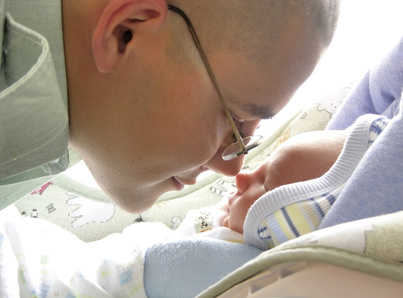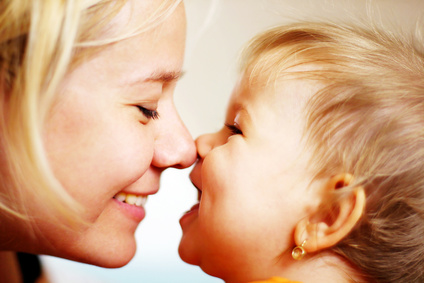What a Newborn Taught Me About Family
I find it absolutely amazing! When only days old, a newborn can differentiate the smell of their mother from other women. At birth, they recognize their parent’s voice and will turn toward their parent’s voice rather  than the voice of another adult. On the other hand, a newborn’s eyesight is poor. They can only see well at a distance of 8-10 inches. Still, they gaze…and when they gaze, we gaze back. We love to move in close to our baby’s face and gaze into their eyes. And, while mother and child gaze into one another’s eyes, they are building a bond. Amazing, right? Even more amazing, 8-10 inches (the distance a newborn can see well) is the distance between a nursing child and her mother’s face. While nursing, a child rests the perfect distance from her mother’s face to gaze into her eyes…helping to nurture that relational bond. What an amazing design!
than the voice of another adult. On the other hand, a newborn’s eyesight is poor. They can only see well at a distance of 8-10 inches. Still, they gaze…and when they gaze, we gaze back. We love to move in close to our baby’s face and gaze into their eyes. And, while mother and child gaze into one another’s eyes, they are building a bond. Amazing, right? Even more amazing, 8-10 inches (the distance a newborn can see well) is the distance between a nursing child and her mother’s face. While nursing, a child rests the perfect distance from her mother’s face to gaze into her eyes…helping to nurture that relational bond. What an amazing design!
 than the voice of another adult. On the other hand, a newborn’s eyesight is poor. They can only see well at a distance of 8-10 inches. Still, they gaze…and when they gaze, we gaze back. We love to move in close to our baby’s face and gaze into their eyes. And, while mother and child gaze into one another’s eyes, they are building a bond. Amazing, right? Even more amazing, 8-10 inches (the distance a newborn can see well) is the distance between a nursing child and her mother’s face. While nursing, a child rests the perfect distance from her mother’s face to gaze into her eyes…helping to nurture that relational bond. What an amazing design!
than the voice of another adult. On the other hand, a newborn’s eyesight is poor. They can only see well at a distance of 8-10 inches. Still, they gaze…and when they gaze, we gaze back. We love to move in close to our baby’s face and gaze into their eyes. And, while mother and child gaze into one another’s eyes, they are building a bond. Amazing, right? Even more amazing, 8-10 inches (the distance a newborn can see well) is the distance between a nursing child and her mother’s face. While nursing, a child rests the perfect distance from her mother’s face to gaze into her eyes…helping to nurture that relational bond. What an amazing design! As babies get a little older, they begin to “coo.” When a baby coos, everyone in the room, especially women, stop their conversation and move toward the baby…relationships are encouraged. I find all this amazing. A baby’s physical senses, her reflexes, and her actions draw her into relationship with other people and, even more, encourages that relationship to grow. Even the simple, natural act of nursing a baby encourages and enhances a relationship that is supported by the baby’s unique sense of taste, smell, and vision as well as her inherent reflexes. What an awesome design! Why do I share this? Because I believe that this design points out the primacy of relationships between a child and parent.
 Parents spend the first year of their baby’s life holding their baby, feeding their baby, and showering their baby with love…in other words, enhancing a relationship with their baby. Of course, relationships do not stop after that first year. We continue to nurture relationships with our children throughout our life. As we do, the parent-child relationship becomes foundational to all other parent-child interactions, whether focused on fun or discipline. The parent-child relationship even empowers the parent and the child. Consider the power of the parent-child relationship.
Parents spend the first year of their baby’s life holding their baby, feeding their baby, and showering their baby with love…in other words, enhancing a relationship with their baby. Of course, relationships do not stop after that first year. We continue to nurture relationships with our children throughout our life. As we do, the parent-child relationship becomes foundational to all other parent-child interactions, whether focused on fun or discipline. The parent-child relationship even empowers the parent and the child. Consider the power of the parent-child relationship. · The parent-child relationship lays the foundation that allows a parent to effectively instill values into their child’s life and it frees the child to internalize those values.
· Limit-setting and discipline becomes most effective within a strong, loving relationship.
· Children who have a strong, loving relationship with their parent are more invested in keeping the rules their parents have established.
·
 Children with a history of strong, loving relationships internalize positive rules and values from their family.
Children with a history of strong, loving relationships internalize positive rules and values from their family. · Children and teens who have experienced strong, loving family relationships have a better self-image. They come to believe in their own sense of worth and adequacy. They will more likely develop a humble self-confidence.
· Teens who experience a strong, loving relationship with parents tend to engage in less oppositional behavior (notice only “less oppositional behavior” not “no oppositional behavior”).
· Young adults who have had a strong, loving relationship with their parent will find it easier to leave home at the appropriate time to “start their own life.” They feel more secure in their ability to successfully navigate the adult world.
· Children who experience strong, loving relationships with their parents are more likely to have healthy friendships and healthy romantic interests as adults.
Perhaps that is one of the messages God has intended for us to learn from newborns and infants: Strong, loving relationships within the family are foundational to all other aspects of family. Our very design is geared toward relationship and our very lives are shaped by relationship. We begin those relationships even before a child is born. We nurture those relationships from the time our child is conceived. And, we continue growing those relationships throughout our lives!